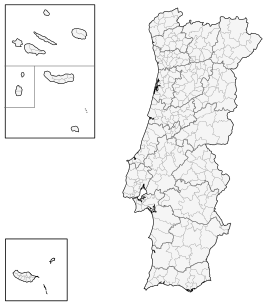|
2025 Portuguese local elections
Local elections will be held in Portugal in late September or early October of 2025. The election consistes of three separate elections in the 308 Portuguese municipalities, the election for the Municipal Chambers, whose winner is automatically elected mayor, similar to first-past-the-post (FPTP), another election for the Municipal Assembly, as well an election for the lower-level Parish Assembly, whose winner is elected parish president. This last will be held separately in the more than 3,000 parishes around the country. In this election, 38.3 percent of incumbent mayors, 118 to be precise, will be barred from running for another term: 54 from the PS, 44 from the PSD, 11 from CDU, 5 Independents, 3 from the CDS–PP and 1 from Together for the People.[2] The number of parishes up for election could also grow from the current 3,092 because of changes in the 2013 local reform law that will allow the separation of merged parishes.[3] BackgroundDateAccording to the local election law, an election must be called between 22 September and 14 October of the year that the local mandates end. The election is called by a Government of Portugal decree, unlike general elections which are called by the President of the Republic. The Election date must be announced at least 80 days before election day. Election day is the same in all municipalities, and should fall on a Sunday or national holiday. The 2025 local elections should, therefore, take place no later than 12 October 2025.[4] Electoral system All 308 municipalities are allocated a certain number of councilors to elect corresponding to the number of registered voters in a given municipality. Each party or coalition must present a list of candidates. The lists are closed and the seats in each municipality are apportioned according to the D'Hondt method. Unlike in national legislative elections, independent lists are allowed to run. Council seats and Parish assembly seats are distributed as follows:
a For parishes with more than 30,000 voters, the number of seats mentioned above is increased by one per every 10,000 voters in excess of that number, and then by one more if the result is even. PartiesThe main political forces that will be involved in the election are:
1 The PSD and the CDS–PP are expected to form coalitions in several municipalities between them and with some smaller center-right/right-wing parties like the Earth Party (MPT) and the People's Monarchist Party (PPM). Opinion pollsKey RacesThe following table lists the current party control in all district capitals, highlighted in bold, as well as in municipalities above 100,000 inhabitants. Population estimates from 2023.[6] See alsoReferences
External links |
|||||||||||||||||||||||||||||||||||||||||||||||||||||||||||||||


